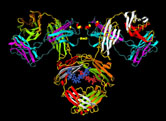|
Katherine Knight –
immunologist |
 |
"Science is
a continual process with the depth of discovery defined by one's depth
of curiosity." |

|
| |
|
|
|
| |
How were you motivated to become an
immunologist? |
| |
I
grew up on a farm and was always curious about nature, wanting to
know why plants were green and how birds knew to fly south in the
fall. I discovered science in my high school chemistry class where
I was exposed to a clarity of thought that I had never before encountered.
In college, I had the good fortune of having a chemistry professor
who reached out and showed me how much fun working in the lab could
be. She showed me that I could be someone that I had not imagined
I could be. This experience propelled me to graduate school where
I had the further good fortune to have a mentor who helped me develop
a scientific mind and shared with me his unrivaled excitement for
understanding nature, especially the immune system.
The
term immunology refers to the body's organ system that provides
both the biologic (bodily) basis of an individual's personal identity
as well as the system of defense which protects the body from disease
producing invasive foreign agents. That is, the cells of the immunologic
organs are the physical site of the body's ability to recognize
self from non-self. It is the ability for self recognition that
enables the defensive, policing powers of the immune system to protect
the body from disease producing invasive foreign elements. I became
so fascinated by this phenomenon that I felt literally impelled
to study it.
|
|
 |
| |
|
|
|
| |
What can you share about your creative process? |
| |

|
|
My
interest lies in the scientific investigation of nature, in particular
the study of what controls the number and kinds of protein molecules
(termed antibodies) that protect us from disease.
The
creative process, as I experience it, has three components. The
first component consists of acquiring and maintaining an in-depth
knowledge of the specific area to be investigated. The second component
is the scientific investigation itself. Broadly speaking, the early
phase of this investigation can be characterized as the time at
which the "thinking" about the research drives the "doing" of the
research and, as the investigation evolves, the "doing" becomes
the driver of the "thinking". As I wrap my mind around a problem
and the research closes in on the target of the unknown, I discover
that my thinking about the problem has become a kind of "thinking
without boundaries," and the experience takes one to places one
never dreamt of going. This process leads to successive experiments
which will in turn drive the thinking which at some point reveals
a new level of understanding.
The
third component of the creative process is the relationship experience
which is comprised of an ongoing dialogue with scientific colleagues.
In my case the discovery that relationships are intrinsic to doing
science stems from the enriching experience with the professors
who mentored my Ph.D. and post-doctoral studies. Mentoring and collegial
relationships are at the heart (core) of the creative process because
they nurture and support it.
|
|
| |
|
|
|
| |
What ideas do you have for a future human community on Mars?
|
| |
The most important dimension of a Mar's community will be the
social makeup that determines and regulates the dynamics of community
living. For optimal success one will need individuals who are competent
in diverse areas of expertise, such as science, engineering, medicine,
household utilities (plumbing, lighting, ventilation, etc.), music,
recreation, sports, etc. However, most importantly, all the community
members must possess the highest integrity with respect to caregiving
ideals which will ensure that everyone will be similarly motivated
to do whatever is necessary to make the community function optimally.
Specifically, each member of this group must have the ideal to
take care of the group and even more importantly be able to know
that the ability for the best caretaking of the group derives from
a secure ability to take care of oneself. This frame of mind will
be especially important because of the stressful living conditions
on Mars.
My hope would be that this community would learn to live a fulfilling
life in spite of the adverse nature of the environment which will
enforce confined living quarters. And just as importantly, my hope
is that they can do this without destroying the environment.
|
|

|
|




